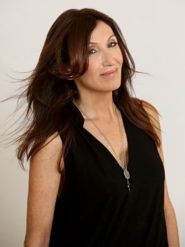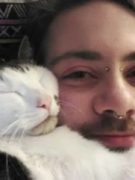Francesca Lia Block, Author

Photo Credit: Nicolas Sage Photography
I still remember the moment I first swiped one of Francesca Lia Block’s books from my big brother’s bookshelf. Splayed out across my family’s living room floor in our downtown Los Angeles apartment, I devoured the modern fairy tales in Blood Roses with a hunger I hadn’t realized was there. Moving on to her other works, I began to see parts of my own life—the troubled-yet-loving Witch Baby from Weetzie Bat, the girl with two moms who goes searching for her long-lost father in the story “Dragons in Manhattan,” the brave girl with the fairy friend who eventually exposes her abuser in I Was a Teenage Fairy. I was a quiet, shy kid, but the fantastic worlds and characters I found in these stories gave me the inner courage I needed to start thinking about who I wanted to be. I came to realize that I wanted to be a writer, not just of entertaining stories, but of important ones—just like Francesca Lia Block. I never dared to dream that almost twenty years later, I would have the good fortune of working with Francesca as my writing mentor. Her guidance has transformed my writing and inspired me to reach further, try new things, and strive to achieve my full potential. She is a compassionate, dedicated human being, and to me, she will always be magical.
Francesca Lia Block is the author of more than twenty-five books as well as numerous stories, poems, essays, and interviews. She received the Spectrum Award, the Phoenix Award, the ALA Rainbow Award, and the 2005 Margaret A. Edwards Lifetime Achievement Award. Earlier this year, she announced to the delight of her fans that her award-winning debut novel, Weetzie Bat, will be adapted into a film starring Anya Taylor-Joy. Her most recent book, The Thorn Necklace, is part memoir and part craft book, detailing her own life experiences as well as her 12 Questions to guide the writing process. She was born and raised in Los Angeles, where she still lives and teaches.
I interviewed Francesca via instant messenger on August 13, 2018.
Adrien Kade Sdao: So, I wanted to start by saying congratulations on the Weetzie Bat movie!!! Such exciting news.
Francesca Lia Block: Thank you.
AKS: I know it’s been a long time in the making. What emotions are you feeling? What challenges still lie ahead?
FLB: A lot. We are still working out financing details, etc. I’m trying not to think about it all too much.
AKS: I can understand how it might be overwhelming.
FLB: I have waited so long so it feels like a lot is at stake. And I also feel responsible to my fans. But the cast seems really great.
I think a lot of young people read books for older people and vice versa. It seems mostly like a marketing issue. I’d have to say try to publish with your target audience in mind to avoid being trapped in a different genre.
AKS: Yes, they certainly do. You wrote the screenplay, correct? I’m guessing maintaining creative control is very important to you.
FLB: I wrote it and then my friend, director Elgin James, did a pass. I would like some creative input but I’m learning that it’s hard to have creative control unless you are the person with the funds.
AKS: Ah, I understand. Well, I’m looking forward to hearing more about the movie and seeing it of course!
FLB: Thank you! I will keep everyone posted as soon as I know more! I really appreciate all the interest and support!
AKS: I wanted to ask you about something you mentioned in a previous interview (https://robinlmartinez.com/2016/02/13/an-interview-with-francesca-lia-block/). You said that some of your earlier work was written for adults, but marketed to teens. How has this affected your career? How does your writing differ when you’re writing intentionally for teens?
FLB: I honestly never really write for teens. I’m thinking more about the story I want to tell. A few of my books were specifically contracted for younger audiences, so I had to keep that in mind, but I still try to tell the story I feel I need to tell.
AKS: Wow, as someone who read your books from a young age, I find that very interesting. I feel like it shows how mutable the line between teen and adult literature is. What advice would you give to writers in similar situations in terms of their target audience?
FLB: Yes, I think a lot of young people read books for older people and vice versa. It seems mostly like a marketing issue. I’d have to say try to publish with your target audience in mind to avoid being trapped in a different genre. I like to write in many genres, but it is hard for audiences to understand. Branding is important though, and can be frustrating. I always just wanted to write dark fairy tales and myths for myself and my friends. I should say, “dark, literary fairy tales and myths.” That is what I love to read.
I try to be sensitive. I do my best. I make mistakes. I think it is a challenge and it’s important to be sensitive and try your best.
AKS: So you write the sort of thing you would love to read? Are there any recent books that you fell in love with?
FLB: Not always, but in general, yes. I’ve been revisiting all the classics! I’m obsessed with what we are reading for class, for instance—Virginia Woolf, Isabel Allende, Baldwin, Angelou, Morrison, Shirley Jackson. I just read this book called The Magus by John Fowles that blew my mind. The southern Gothic women—Katherine Anne Porter and Carson McCullers. Murakami, Faulkner, Hawthorne, D.H Lawrence, Thomas Hardy, Colette, Angela Carter. I have to get caught up on a lot of contemporary literature, but right now I’m just delving into classics and modern classics. And you might say, those aren’t fairy tales, but actually, I’m writing a paper about the way the fairy tale and goddess mythology is hidden in a lot of literature in the canon.
AKS: Ah, yes! I was enthralled with your seminar last residency and how you related the gothic to Goddess mythology. Do you find that you appreciate these novels more for their stories or for the way they were crafted?
FLB: Thank you! Both! I think it depends on the book but I value plot and craft about equally, depending.
AKS: I suppose it takes a good balance of both for something to become a classic in the first place.
FLB: Yes! Even when a book seems not to be “plot-heavy,” like Woolf’s work, there is a lot of tension and conflict there as well.
AKS: I’m looking forward to reading To the Lighthouse. It’ll be my first Virginia Woolf!
FLB: I hope you like it! I would suggest just letting the words wash over you like waves.
AKS: That’s great advice! Thank you. I’d like to ask you about The Thorn Necklace. What made you decide to write a memoir/craft book instead of one of each? Also, as a deeply emotional person, was writing such a personal work of nonfiction more challenging than channeling that emotion into fiction?
FLB: It was harder than writing fiction because there was no scrim to hide behind. I wanted to write separate memoir and craft books but the craft book idea was a little short and my publisher suggested I combine them. It took me a while to figure out how to do it though. It felt organic in the end, which is what I wanted.
AKS: I’ve always loved how you showed a multitude of human experiences in your work, and you don’t shy away from showing the real consequences of the oppression of minority groups. As an ally, how do you navigate writing about groups you’re not part of? Like writing a trans character as a cis woman.
FLB: It’s tricky these days. I try to be sensitive. I do my best. I make mistakes. I think it is a challenge and it’s important to be sensitive and try your best.
AKS: You said, “these days.” Is it harder now than it was when you first started writing?
FLB: Yes, there is a lot more awareness and sensitivity, which is a good thing, but can feel daunting but, feeling daunted isn’t as much of a challenge as being oppressed so…
It was harder than writing fiction because there was no scrim to hide behind.
AKS: Ha, that’s a great way to put it! It certainly is an ongoing learning process.
FLB: Yes, I feel that is true.
AKS: My final question is: what was your favorite picture book to read to your kids when they were little?
FLB: Well I love Where the Wild Things Are but I think my absolute favorite is Mr. Rabbit and the Lovely Present by my first editor Charlotte Zolotow. Have you read it?
AKS: I haven’t, but I recognize the name. I’ll have to add that to my endless “to read” list.
FLB: Right? It never ever ends.
AKS: This whole MFA thing still seems surreal–I bet yours does, too, considering you’ve been publishing for many years already!
FLB: Yes, it is weird, but it has helped my work and my teaching. I just wrote a novel in my program and I feel very excited about it. I do think that all the intensive reading and annotating really works.
AKS: That’s great. Hopefully I’ll get to read it eventually!
FLB: Thank you. It’s been lovely to chat with you.
AKS: Yes, I totally agree! You too. Thanks so much for your time.
 Adrien Kade Sdao writes young adult fiction and works in a children’s bookstore in Los Angeles. They are an MFA candidate at Antioch University, Los Angeles, and they are the lead editor for the Young Adult genre at Lunch Ticket. Their work has appeared in Lunch Ticket and Womanpause. They live in North Hollywood with their cat, Shelly.
Adrien Kade Sdao writes young adult fiction and works in a children’s bookstore in Los Angeles. They are an MFA candidate at Antioch University, Los Angeles, and they are the lead editor for the Young Adult genre at Lunch Ticket. Their work has appeared in Lunch Ticket and Womanpause. They live in North Hollywood with their cat, Shelly.




